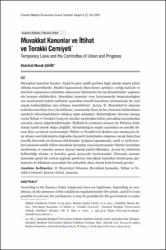| dc.contributor.author | Şahin, Abdullah Musab | |
| dc.date.accessioned | 2023-03-27T11:10:17Z | |
| dc.date.available | 2023-03-27T11:10:17Z | |
| dc.date.issued | 2021 | en_US |
| dc.identifier.citation | Şahin, A. M. (2021). Muvakkat kanunlar ve ittihat ve terakki cemiyeti. İstanbul Medipol Üniversitesi Hukuk Fakültesi Dergisi, 8(2), 445-473. https://dx.doi.org/10.46547/ imuhfd.2021.08.02.11 | en_US |
| dc.identifier.issn | 2148-6883 | |
| dc.identifier.uri | https://dx.doi.org/10.46547/ imuhfd.2021.08.02.11 | |
| dc.identifier.uri | https://hdl.handle.net/20.500.12511/10708 | |
| dc.description.abstract | Muvakkat kanunlar Kanûn-ı Esâsî’ye göre çeşitli şartlara bağlı olarak meşru kabul
edilmiş tasarruflardır. Madde kapsamında düzenlenen şartların varlığı halinde ve
meclisin toplanması mümkün olmuyorsa hükümetin bu tip düzenlemeler yapması
söz konusu olabilecektir. Muvakkat kanunlar veya kararnameler imparatorluğun
son senelerinde hukuk tarihimiz açısından önemli kararların alınmasında bir usul
olarak kullanıldıkları için oldukça önemlidirler. Ayrıca, II. Meşrutiyet’in ilanının
ardından meclisin önce yüceltilmesi, sonrasında biraz da bu yöntemin kullanılması
suretiyle etkisizleştirilmesi oldukça tepki çekmiştir. Bahsettiğimiz döneme damga
vuran İttihat ve Terakki Cemiyeti, bazıları tarafından bütün muvakkat kanunlardan
sorumlu olarak değerlendirilmiştir. Halbuki bu yöntemi yalnızca bir İttihatçı silahı
olarak kabul etmek doğru değildir. Sorumluluğun tespiti açısından on senelik dönem ikiye ayrılarak incelenmiştir. İttihat ve Terakki’nin iktidarı tam manasıyla eline alması yani hükümetin doğrudan bu parti üyelerinden oluşması ancak ikinci beş
senelik dönemde söz konusu olabilmiştir. Çalışma kapsamında, 1908 ve 1918 seneleri arasında tasdik edilen muvakkat kanunlar veya kararnameler Düstur üzerinden
incelenmiş ve seneden seneye sayısal olarak tasnif edilmiştir. Ayrıca bu yöntemin
kullanıldığı alanlar ve konular, genel çerçevede incelenmiştir. Dönemin tamamı
açısından genel bir yorum yapmak gerekirse, muvakkat kanunları henüz genç parlamento ile hükümet arasındaki bir mücadele alanı olarak kabul etmek gerekir. | en_US |
| dc.description.abstract | According to the Kanun-ı Esâsî, temporary laws are legitimate, depending on conditions. In the presence of the conditions regulated under the article, and if it is not
possible to convene the parliament, it may be possible for the government to make such temporary laws. These are very important as they were used as a method while
making important decisions in our legal history. Also, in the second constitutional
period, the divine parliament neutralized by using of this method. The Committee
of Union and Progress, which marked the period we are talking about, was considered by some to be responsible for all temporary laws. However, it is not correct
to consider this method only as a weapon of the Unionists. In terms of determining
the responsibility, the ten-year period is divided into two periods. It was only in
the second period that the Committee of Union and Progress entirely took power,
and the government was formed directly from these party members. Temporary
laws approved between 1908 and 1918 were examined on the basis of the Düstur
and classified as numbers from year to year. In addition, the fields and subjects in
which this method is used are examined in a general framework. To make a general
comment in terms of the entire period, it is necessary to accept temporary laws as a
field of struggle between the young parliament and the government. | en_US |
| dc.language.iso | tur | en_US |
| dc.publisher | İstanbul Medipol Üniversitesi | en_US |
| dc.rights | info:eu-repo/semantics/openAccess | en_US |
| dc.subject | II. Meşrutiyet Dönemi | en_US |
| dc.subject | Muvakkat Kanunlar | en_US |
| dc.subject | İttihat ve Terakki Cemiyeti | en_US |
| dc.subject | Kanun-ı Esâsî | en_US |
| dc.subject | Anayasa | en_US |
| dc.subject | The Second Constitutional Period | en_US |
| dc.subject | Temporary Laws | en_US |
| dc.subject | The Committee of Union and Progress | en_US |
| dc.subject | The Ottoman Constitution | en_US |
| dc.subject | Constitution | en_US |
| dc.title | Muvakkat kanunlar ve ittihat ve terakki cemiyeti | en_US |
| dc.title.alternative | Temporary laws and the committee of union and progress | en_US |
| dc.type | article | en_US |
| dc.relation.ispartof | İstanbul Medipol Üniversitesi Hukuk Fakültesi Dergisi | en_US |
| dc.department | İstanbul Medipol Üniversitesi, Hukuk Fakültesi, Kamu Hukuku Bölümü, Genel Kamu Hukuku Ana Bilim Dalı | en_US |
| dc.authorid | 0000-0001-6529-9179 | en_US |
| dc.identifier.volume | 8 | en_US |
| dc.identifier.issue | 2 | en_US |
| dc.identifier.startpage | 445 | en_US |
| dc.identifier.endpage | 473 | en_US |
| dc.relation.publicationcategory | Makale - Ulusal Hakemli Dergi - Kurum Öğretim Elemanı | en_US |
| dc.identifier.doi | 10.46547/ imuhfd.2021.08.02.11 | en_US |
| dc.institutionauthor | Şahin, Abdullah Musab | |
| dc.identifier.trdizinid | 518387 | en_US |


















